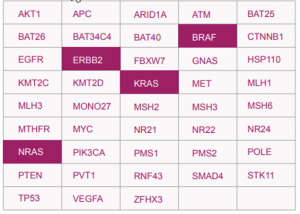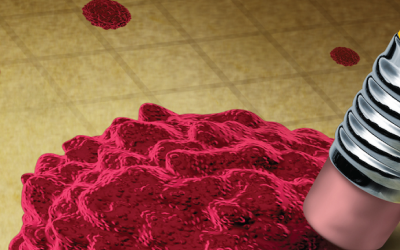NGS test for colorectal cancer to guide targeted therapy
Colorectal cancer (CRC) can develop from germline genetic mutations inherited from family or somatic mutations developed later in life. Our Optiseq™ colorectal cancer NGS for mutation detection panel covers genes associated with both hereditary and somatic mutations that play a role in colorectal cancer development. This 43-gene panel detects 462 genetic alterations including single nucleotide mutation (SNP), copy number change (CNV), insertion/deletions, and chromosomal rearrangements. The whole gene list can be found below. Some of these mutations are in the NCCN (National Comprehensive Cancer Network) guideline (see below).

NGS Colorectal cancer panel mutations
Here are the important gene mutations included in our NGS panel:
1. APC (Adenomatous Polyposis Coli): This is a critical gene related to colorectal cancer development. Mutations in APC gene are associated with familial adenomatous polyposis (FAP), an inherited condition for development of colorectal polyps and further to colorectal cancer.
2. MLH1, MSH2, MSH6, PMS2 (DNA mismatch repair genes): Mutations in these genes are associated with Lynch syndrome (also known as hereditary nonpolyposis colorectal cancer or HNPCC). People with this disease have increased risk for colorectal cancer as well as other cancers, including endometrial, ovarian, and stomach cancers.
3. BRAF: BRAF gene mutation V600E is associated with sporadic colorectal cancer. People with BRAF mutation has a poor prognosis. BRAF mutation detection is also in the guideline of NCCN.
4. KRAS and NRAS: Mutations in the RAS genes, mainly KRAS and NRAS, are common in colorectal cancer and can predict resistance to certain targeted therapies such as the use of anti-EGFR drugs. The testing of the mutations in the 6 codons of each gene is recommended in the NCCN guideline.
5. PIK3CA: Mutations in this gene are associated with the PI3K/AKT/mTOR pathway. They are not only found in breast cancer but also in a subset of CRC.
6. TP53: Mutations in the TP53 gene, a “police officer” in cell to guard for mistakes, also called tumor suppressor gene, are common (as many as 50% of cancer patients) in many types of cancer, including CRC, and are associated with poor prognosis.
7. SMAD4: Mutations in this gene are found in a subset of CRC. SMAD4 mutations are often associated with metastasis and poorer prognosis.
8. STK11 (LKB1): Mutations in this gene are associated with Peutz-Jeghers syndrome. Again, the disease that predisposes people to the development of various cancers, including CRC.
9. CTNNB1: Mutations in this gene are found in a subset of CRC.
10. ERBB2: Amplification of ERBB2, or HER2 gene is common in a subset of CRC and identification of the HER2 amplification is also recommended in NCCN guideline.
11. MSI: Microsatellite disability happens often to people with metastatic CRC. This biomarker is also recommended in NCCN guideline. Starting in 2019, the MSI is also recommended as part of the NGS panel for detection by NCCN.
These are some of the key genes included in our targeted NGS panels for CRC testing. Testing of these mutations provides therapeutic guidance for oncologists when target therapy is necessary. Depending on the panel design and specific clinical needs, other genes associated with CRC and treatment response may also be selected in different NGS panels from different vendors. But our panel has met the NCCN guideline and is able to guide targeted therapy of CRC. No matter what CRC panel is used, it’s important to consult with healthcare professionals or genetic counselors for professional test recommendations and interpretation of test results.
Detection of ROS1, RET, and ALK fusions in non-small cell lung cancer
ROS1 (c-ros oncogene 1), RET (rearranged during transfection), and ALK (anaplastic lymphoma kinase) are receptors of tyrosine kinases that play important roles in cell growth and differentiation. ROS1, RET or ALK fusion is formed by chromosomal rearrangements that...
Who should be tested for VEXAS syndrome?
As a relatively newly discovered autoinflammatory disease, VEXAS (Vacuoles, E1 enzyme, X-linked, Autoinflammatory, Somatic) syndrome is associated with mutations in the UBA1 gene. Diagnosis of the disease relies on the testing of genetic mutation in patients. What are...
Genetic Testing for the VEXAS Syndrome
Diagnosis of the VEXAS syndrome improves medical management of the disease and provides more effective treatment of the disease, although there is no cure currently. The diagnosis relies on the VEXAS syndrome genetic testing, a test for a mutation present in the UBA1...
What is VEXAS syndrome?
VEXAS syndrome, which stands for "Vacuoles, E1 enzyme, X-linked, Autoinflammatory, Somatic," is a rare and recently identified, chronically progressive autoinflammatory disorder. It was first described by Dr. Beck in a study published in the New England Journal of...
Dealing with the Respiratory Viruses that Cause Covid-19 or Flu
Influenza and COVID-19: what are they in common? Currently, the two most important respiratory viruses the healthcare authority is paying attention to are SARS-COV-2 (causing COVID-19) and influenza A and B viruses (Flu A and B). The Flu A and B viruses (named by the...
Early Cancer Detection Will Save More Lives
Cancer deaths due to failure of early detection According to the American Cancer Society researchers, it is estimated that there will be more than 600,000 people die of cancer, and 1.9 million new cancer cases in the US in 2021 alone. Seventy-one percent of the...

